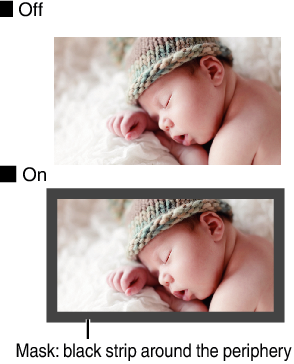Input Signal
TOP
For setting the dynamic range (gradation) of the video input.
If the image is not displayed properly even after selecting “Auto”, select an appropriate setting.
If the dynamic range is not appropriate, the bright areas become overexposed, and the dark areas become underexposed.
|
Setting |
Description |
|---|---|
|
Auto |
Sets the input signal level automatically. |
|
Standard |
Select this setting if you are inputting video signals (dynamic range: 16 - 235). |
|
Enhanced |
Select this setting if you are inputting PC signals (dynamic range: 0 - 255). |
|
Super White |
Select this setting when inputting Super White-compatible device signals (dynamic range: 16 - 255). |
For setting the color space of the input signal.
If the image is not displayed properly even after selecting “Auto”, select an appropriate setting.
|
Setting |
Description |
|---|---|
|
Auto |
Detects “YCbCr (4:4:4)”, “YCbCr (4:2:2)”, and “RGB” automatically. |
|
YCbCr (4:4:4) |
Select this setting when inputting YCbCr (4:4:4) video signals. |
|
YCbCr (4:2:2) |
Select this setting when inputting YCbCr (4:2:2) video signals. |
|
RGB |
Select this setting when inputting RGB video signals. |
Aspect
The screen size of the projected image can be adjusted optimally according to the original screen size (aspect) that has been input.
For setting the interpolation method for the interlaced signals. If the image outline is unnatural, set this item to “Off”.
|
Setting |
Description |
|---|---|
|
Auto |
Performs interpolation by automatically detecting whether the interlaced signals are converted from 24p video images, such as those in film movies, or interlaced signals of video materials. |
|
Off |
Interpolates video images as interlaced signals of video materials, etc. |
For hiding the peripheral area of the image with a mask (black strip).

|
Setting |
Description |
|---|---|
|
Off |
Not masked. |
|
Custom 1 to Custom 3 |
Masks about 0 to 220 pixels of the four sides of the image. The pixel count is 1920 pixels in the horizontal direction and 1080 pixels in the vertical direction. |
3D Setting
For setting 3D movies for viewing.
Adjust the position if the edges of the image are partially missing due to the timing of horizontal and vertical synchronization signals.
Adjustment cannot be made during 4K, 3D and 1080i signal input.
For changing the EDID mode of the [HDMI 2] terminal. Set to “A” under normal condition.
Images with resolution 1920x1080 or lower may not be displayed when some old devices are used.
In that case, connect to the [HDMI 2] terminal and set “HDMI2 EDID” to “B”.
EDID (Extended Display Identification Data) refers to the information, such as supported resolutions, exchanged between devices.
